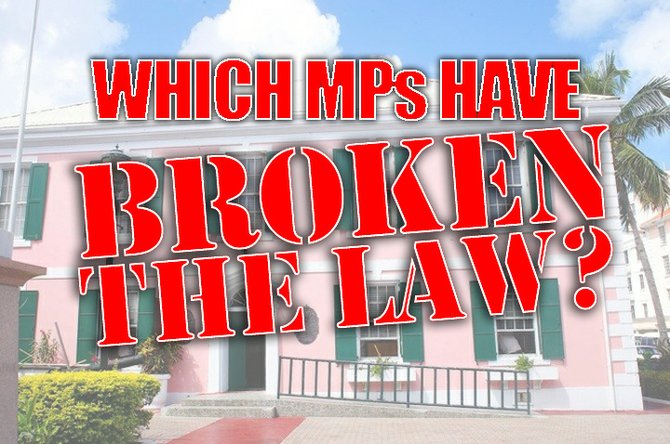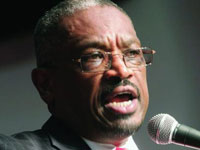Like Bahamians everywhere, I too am watching to see what happens at the leadership level of the party in the very near future. Similarly, not so long ago we all watched with bated breath the leadership struggle in the opposition Progressive Liberal Party.
Now leaders emerge at different times and in different ways. Some are wrought in the belly of adversity and national crisis, while others are crowned with little or no history of struggle whatsoever.
It is in that light that I have listened to all the talk about a certain politician – Bamboo Town MP Branville McCartney to be exact – who has not hidden his desire to succeed Prime Minister Hubert Ingraham as party leader.
There is nothing wrong with ambition, but it must be tempered with reality. If it is true that Mr McCartney is actively plotting Ingraham’s downfall, then he had better read the tea leaves again.
What exactly does Mr McCartney bring to the table? Firstly, let us examine briefly his parliamentary performance as the MP for Bamboo Town. The fact is that he has made very few speeches on the floor of the House since entering those hallowed halls a little over three years ago.
He has not, in my view, distinguished himself as a parliamentary performer, showing judgment and originality in his speeches. He has not demonstrated an ability to think on his feet in the cut and thrust of debate.
It is in these debates that political careers are made or destroyed. He should go back and look at Ingraham’s record as a parliamentary performance. He will learn an awful lot. McCartney has been very silent in the House since resigning as junior immigration minister earlier in the year to take a seat on the back benches.
That brings me to look briefly at his resignation from the cabinet. He claimed that at the forefront of his decision were “feelings of stagnation and the inability to fully utilize my political potential at this time.”
I have already said in an earlier letter that I felt that Mr McCartney’s resignation was motivated by selfish political ambition and an inability to work as a team player in Cabinet.
I think that even Mr McCartney’s supporters would agree that loyalty is an important component in party politics. One must demonstrate that one does not place personal ambition over party loyalty and unity.
What was even more surprising, some say astonishing, was that after his resignation he announced publicly that he did not like the direction in which Ingraham – a sitting prime minister – was leading the country. But despite that, he has remained firmly entrenched in the party. He has continued to strengthen his base in Bamboo Town, not knowing whether the boundaries will remain the same in the next general elections, or, indeed if he will be the party’s candidate next time around. One must not take things for granted in politics.
His resignation speech certainly raised questions in my mind whether Mr McCartney still fully subscribes to, or accepts, the policies of his own party, if he is of the view that the leader is taking the country in the wrong direction.
That brings me to my third point about this so-called leader-in-waiting. Apart from his views on illegal immigration, which I think it is fair to say that all Bahamians share, we really don’t know much -about where he stands on other issues.
If he wants to lead the country – not a petty shop – he must articulate his views on education, job creation and the rights of women and children. He must state a position on the role of private enterprise in the economy, strengthening family life, constitutional reform, prison reform and health care, as examples.
I think the public is entitled to know his views on these things. If I were a delegate at the party’s convention, I would certainly want to know where he, or any other candidate, stood on these issues.
How can a man – or a woman – expect to lead a whole nation without telling the people where he or she stood on these important issues? I am sure that the major financial backers in the party would want to know his views on private enterprise, and the limits of government in the economic life of the country, before casting a ballot for him.
It is not too late for him to explain to the nation his views on these things before the convention.
Lastly, I would just like to touch very briefly on Mr McCartney’s history in his party. Is it fair that he should be allowed to jump the line ahead of men like Dion Foulkes, Zhivargo Laing, Tommy Turnquest, Daron Cash and Carl Bethel in any leadership race? Whatever one’s views on their performances, they have endured the heat of the day, the toils, disappointments and frustration of opposition politics over very many years.
Suppose, for argument sake, that McCartney challenges Ingraham at the convention and wins. That would mean that Mr McCartney would be thrust suddenly into the seat of prime minister over night. That is what would happen.
That would mean that Ingraham would, in all probability, resign from the Cabinet. He might revert to the back benches, or he might resign from the party altogether.
That would mean that the country would be saddled with a prime minister who was not elected in a general election; who has never been tested in any crisis and who, apart from his views on immigration, is a totally unknown commodity. Would that even be fair to Mr McCartney? Would it be fair to the country?
Mark Symonette-Rolle
Nassau, The Bahamas
September, 2010



